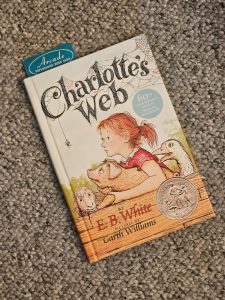I must have read Charlotte’s Web by E.B. White dozens of times; probably for the first time when I was about thirteen. The book and I are the same age, both of us born in 1952.
Charlotte’s Web was in a pile of books I had pulled from Dan’s study, mostly children’s books: The Phantom Tollbooth, The Wind in the Willows, The Water-Babies. I remember Dan telling me that he had never read it and he bought a copy because, I guess, I rhapsodized about it.
A Writer’s Thoughts
Kate DiCamillo wrote a foreword for the 60th anniversary edition. She told how she had avoided the book assiduously from childhood until her thirty-first year, when, she said, “I was strong-armed into it by a writing teacher who held the book up as a miracle of storytelling.”
The cover of the book made DiCamillo “nervous.” She suspected that such a picture meant that “things couldn’t possible turn out well.” Then she discovered the truth:
“And things didn’t turn out well.
But they also did turn out well.”
She continued: “And that, for me, is the crux of the miracle of this book: within the confines of its pages, something terrible, something unbearable, happens. And yet, we bear this unbearable thing. And in the end, we even rejoice.”
Naomi
I had returned from my trip with Dan’s ashes to Paris and Lithuania with a vicious ear infection in my right ear, the only ear with hearing. In the course of two weeks of isolation in my deafness, I thought about Boston, family and friends. There was an exhibition at the Museum of Fine Arts I wanted to see. I wanted to spend time with brother Tim. With luck, Naomi, buddy from teaching days at Plymouth State in New Hampshire–and someone almost as ill-behaved in art museums as I–might be free. Lacking a current email, I texted her.
Her husband Bob responded almost immediately. Naomi had had a devastating stroke and had died on October 21. Three days after I returned from Europe.
My heart stopped.
Bob
“We had been together 64 years, all our adult lives,” he wrote.
And what could I say to him? “I just adored her. I adored getting scolded by guards when we were noisy in the Fogg. I adored our gossip. And I so admired her accomplishments. Naomi was just a blessing in every possible way.”
Bob concluded with the certainty of truth: “A most adorable person. No mean bones. Utterly without guile. Joyful and engaged.”
I reached for Charlotte’s Web.
Death is Certain
The opening line is “Where’s Papa going with that ax?” The runty piglet who will become Wilbur is going to be killed before he has a chance to live. A month later, Wilbur goes to live on Uncle Homer Zuckerman’s farm where he learns from an old sheep that that they’re going to kill him, turn him into smoked bacon and ham.” Understandably terrified, Wilbur turns to Charlotte, the gray spider who weaves her web in the corner of the doorway. She spends days thinking and ultimately devises the most brilliant plan. She will weave words into her web and the gullible humans will interpret it as a sign, a communication from the divine.
Charlotte, of course, is right. Butcher “Some Pig”? Turn a pig who is “Terrific” and “Radiant” into pork chops? It will never happen.
While Charlotte saves Wilbur for a long life of comfort, delicious slops and naps in the sunshine, she herself is only an ordinary spider whose span is short. While Wilbur saves Charlotte’s precious egg sac, “No one was with her when she died.”
The Moment
But I was with Dan, sleeping beside him when he died. I am sure Bob was holding Naomi’s hand as she slipped away.
Wilbur protected Charlotte’s egg sac and shifted into a life which, while always bereft of his good friend and a good writer, remained comfortable, rich with community, secure. I myself have fallen back on the structures I devised as a single woman and then a single mother. Those memories are the madeleine for which the sights, sounds, rhythms of Paris were, a month ago, the perfume.
My life with Dan lasted thirty-nine years, a tick more than half my lifetime.
Bob has his children and grandchildren and a few good friends. And a 64-year-old emptiness where his soul had lived for nearly all of his.
Emptiness
Loss does not turn out well. Life, however, continues and we make of it what we are able to. Something from nothing. A world no better, often less, certainly different because all of those losses remain.
We “bear the unbearable.”
“Rejoice?” Perhaps not.

